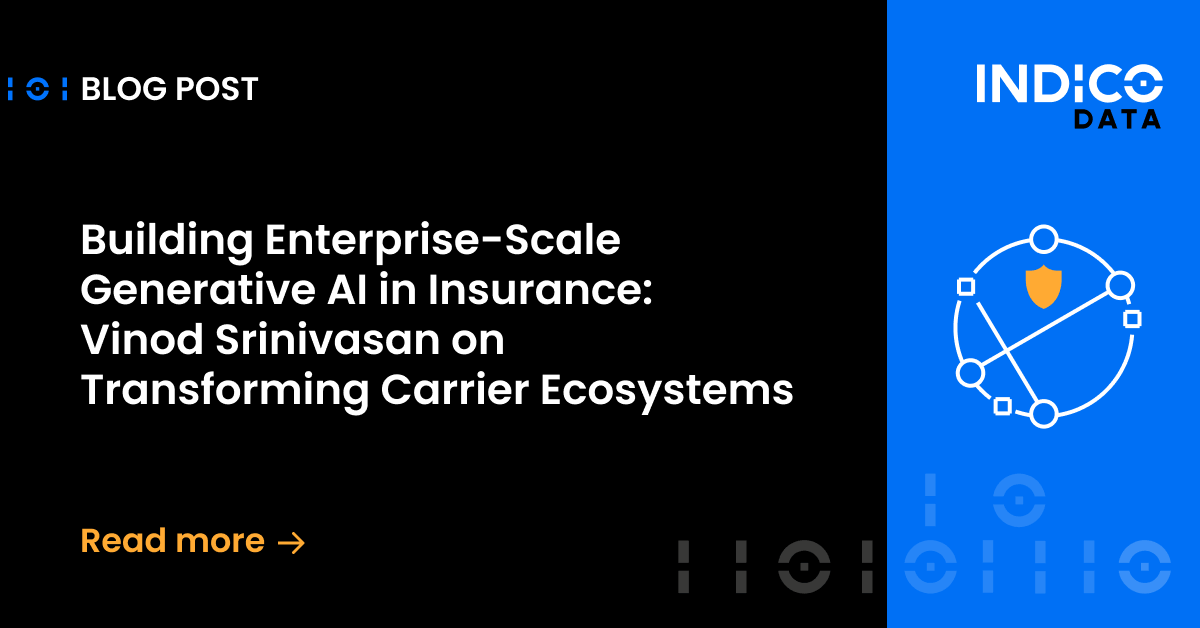The insurance industry is on the verge of a major transformation in the age of technology and data. In episode 44 of the Unstructured Unlocked podcast, InsTech’s Robin Merttens talks about this shift with Tom Wilde, CEO of Indico. In this conversation, they discuss the role of automation in streamlining insurance claims processing and underwriting and offer insights for insurers aiming to navigate these shifts.
Listen to the full podcast here: Unstructured Unlocked episode 44 with Tom Wilde, Indico Data CEO, and Robin Merttens, Executive Chairman of InsTech
The imperative of data in decision-making
Wilde presents a vision where automation technologies are employed to use the vast amounts of data available, which becomes a strategic necessity for insurance firms. “Embracing automation is not just about keeping pace with technology—it’s about strategically utilizing these tools to secure a competitive edge in the insurance market.” This conversation introduced the concept of a ‘decision economy’ that highlights the importance of informed decision-making, which is powered by machine learning and AI.
Automation’s role in insurance underwriting and claims
Much of the conversation revolves around how automation and intelligent intake solutions can streamline complex insurance underwriting and claims processes. As Tom shares, “Automation is revolutionizing the way we handle insurance claims and underwriting, speeding up processes and increasing accuracy to drive customer satisfaction and efficiency.” These technologies accelerate workflows and enhance decision accuracy, improving customer satisfaction and operational efficiency, “In the decision economy, leveraging vast amounts of data through automation isn’t just an option; it’s a strategic necessity for insurance firms,” Tom says.
Related content: How to adopt AI with intention and quality: tips from Sunil Rao
Educational takeaways for the insurance industry
“Adopting automation technologies requires a rational approach, focusing on their practical and safe application to truly transform our industry practices,” advises Tom. The message for those in the insurance sector is clear: embracing automation is not merely about keeping pace with technological advancements but strategically utilizing these tools to gain a competitive edge.
The path forward
In conclusion, this conversation provides guidance for insurance professionals dealing with automation and data management complexities. By understanding and applying the insights shared by Merttens and Wilde, insurers can enhance their processes, making them more efficient, accurate, and customer-centric. As the industry continues to evolve, those who harness the power of automation and data will undoubtedly lead the way.
Related content: Everest Group deems Indico leader in intelligent document processing for insurance — and in enabling “data-driven decision-making at enterprise scale”
Listen and learn
For a deeper understanding of the intricacies discussed and to hear firsthand from the experts, tune into the full episode of Unstructured Unlocked on your favorite platform, including:
Save your spot in our upcoming webinar: From expertise to AI: bridging the knowledge gap in insurance underwriting
Frequently asked questions
- What specific types of automation technologies are being implemented in insurance underwriting and claims processing? In the realm of insurance underwriting and claims processing, the specific types of automation technologies being implemented include machine learning algorithms, natural language processing (NLP), robotic process automation (RPA), and predictive analytics. These technologies are tailored to enhance the accuracy and speed of data processing, aiding in tasks like assessing risk profiles, automating routine data entry, evaluating claim authenticity, and predicting potential fraud.
- How are insurance companies ensuring the security and privacy of the vast amounts of data being used in automation? Regarding the security and privacy of data used in automation, insurance companies are increasingly adopting rigorous cybersecurity measures. This includes implementing strong data encryption, conducting regular security audits, and employing comprehensive access controls. Additionally, many firms are incorporating advanced cybersecurity technologies such as blockchain for secure data sharing and AI-driven security systems to monitor and respond to threats in real-time, ensuring compliance with regulations like GDPR and HIPAA.
- What are some examples of the challenges or pitfalls that firms have encountered while adopting these automation technologies? As for the challenges encountered during the adoption of these technologies, insurance companies often face issues such as integration complexities with existing systems, the high initial costs of implementing new technologies, and resistance from employees due to the fear of job displacement. Moreover, there’s the challenge of ensuring data quality and consistency, which is crucial for the effective application of AI and machine learning. To mitigate these issues, many firms invest in training programs to upskill their workforce and engage in phased technology rollouts to ensure smooth integration with legacy systems.


